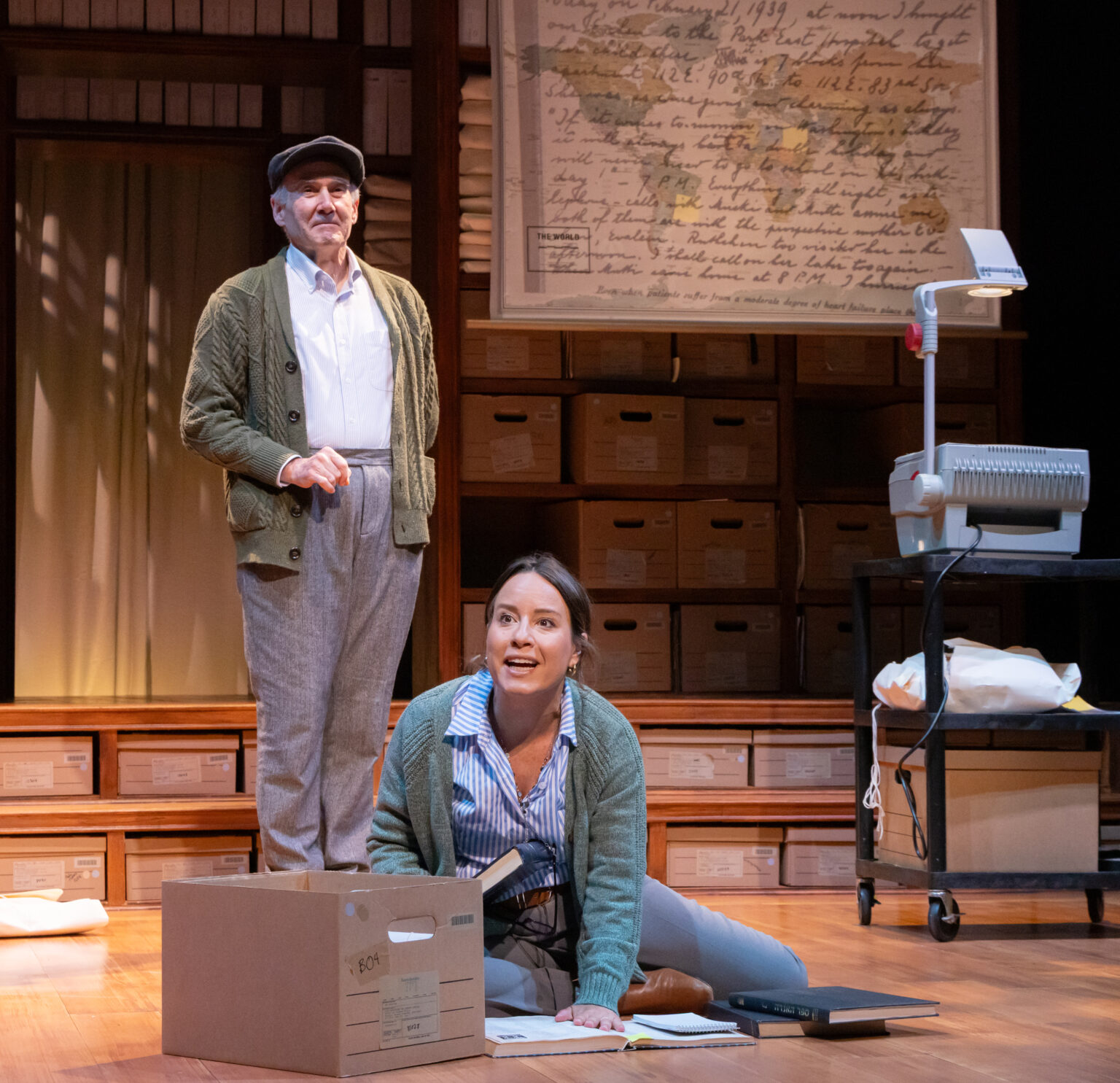Rediscovering Roots: An Intimate Journey in “The Berlin Diaries”
In the heart of Washington, D.C., Theater J presents a compelling reinterpretation of personal history through Andrea Stolowitz’s “The Berlin Diaries.” The production features Dina Thomas portraying the playwright herself, delivering a performance that delicately balances vulnerability and resilience. Meanwhile, Lawrence Redmond takes on multiple roles, including the ghostly figure of Andrea’s late grandfather, whose preserved journals ignite the narrative’s exploration of memory and identity.
Multifaceted Characters and Dynamic Performances
Redmond’s versatility shines as he seamlessly transitions between Andrea’s Uncle David and a host of other characters hailing from diverse global backgrounds-ranging from Brazil and South Africa to New York City and the Pacific Northwest. This multiplicity of roles underscores the play’s intricate structure, which might initially seem chaotic but gradually reveals a thoughtful design. The actors’ skillful dialogue exchanges-often splitting a single thought between two characters or within the same scene-evoke the complex process of genealogical discovery, where identities intertwine and stories overlap.
A Playful Approach to Serious Themes
The play’s unconventional format, which involves rapid shifts and overlapping dialogues, mirrors the tangled nature of family histories. For example, the narrator might clarify, “The Thomas who was killed in 1762 was a farmer; his son, also named Thomas, became a Presbyterian minister,” illustrating how family stories often require careful disentangling. This technique effectively captures the experience of genealogists and descendants piecing together fragmented narratives, highlighting the challenge of reconstructing a past that is often incomplete or obscured.
The Personal and the Universal in Family Histories
What sets “The Berlin Diaries” apart is its focus on Andrea’s character-an unassuming playwright and educator who, unlike the archetypal genealogist, exhibits little obsession with ancestral details. Her family, though Jewish and emigrating from Germany, is portrayed as somewhat distant and unremarkable in her eyes. Her mother’s preserved diaries seem more like relics than treasures, and Uncle David’s dismissive remark-“Everyone made it here alive. There’s nothing to uncover”-reflects a common attitude among those who believe their history is straightforward.
Yet, Andrea’s curiosity persists. Driven by a desire to understand her roots, she embarks on a journey to Europe, applying for grants and immersing herself in the past. Her quest reveals far more than she anticipates, illustrating how personal histories often contain surprises that challenge assumptions and deepen understanding.
Unveiling Hidden Histories
Throughout its concise 90-minute runtime, “The Berlin Diaries” navigates a spectrum of revelations-from mundane details like street addresses to profound moments of recognition, such as discovering a family member’s name on a weathered gravestone. These discoveries serve as poignant reminders that, despite meticulous record-keeping during the Holocaust era, many family stories remain elusive or lost-an enduring testament to the fragility of memory and history.
Artistic Excellence and Visual Storytelling
Under the sensitive direction of Elizabeth Dinkova, the production employs warm wooden set pieces by Sarah Beth Hall and an abundance of papers and documents-props curated by Pamela Weiner-that evoke the intimacy of personal archives. The lighting design by Colin K. Bills and the subtle projections by Deja Collins craft a lyrical visual language that enhances the play’s reflective tone, immersing audiences in a contemplative atmosphere.
Skilled Performances and Thoughtful Tone
Thomas and Redmond’s performances exemplify seasoned professionalism, balancing humor and gravity with a quiet charm. Their portrayal of complex characters ensures that the play’s serious themes-such as loss, remembrance, and the persistence of memory-are conveyed with nuance. The script’s occasional humor, including a light anatomical joke and mild sarcasm near the phrase “never forget,” prevents the narrative from becoming overly somber, maintaining a delicate equilibrium.
Confronting the Silence of the Past
Stolowitz’s script masterfully captures the emotional weight of uncovering a relative’s name while grappling with the realization that much of their story remains shrouded in silence. Andrea’s reflection-“He who forgets what he cannot change is happy”-echoes her grandfather’s words, yet leaves her uncertain whether true peace lies in forgetting or in remembrance. This tension resonates deeply with audiences familiar with the struggles of preserving family histories, especially among Jewish Americans whose ancestors’ stories were often silenced or lost.
A Contemporary Reflection on Heritage and Memory
“The Berlin Diaries” echoes the themes explored in Tom Stoppard’s “Leopoldstadt,” which also examines Jewish identity and history through a personal lens. It speaks to a universal experience shared by many descendants of displaced families-those who grapple with the silence of the past and the desire to reclaim lost stories. As of 2023, with ongoing efforts to document and preserve Holocaust histories, plays like this serve as vital reminders of the importance of memory and the enduring human need to connect with one’s roots.
Performance Details
“The Berlin Diaries” runs through June 29 at Theater J, offering an approximately 90-minute experience without intermission. For tickets and more information, visit TheaterJ.org.

